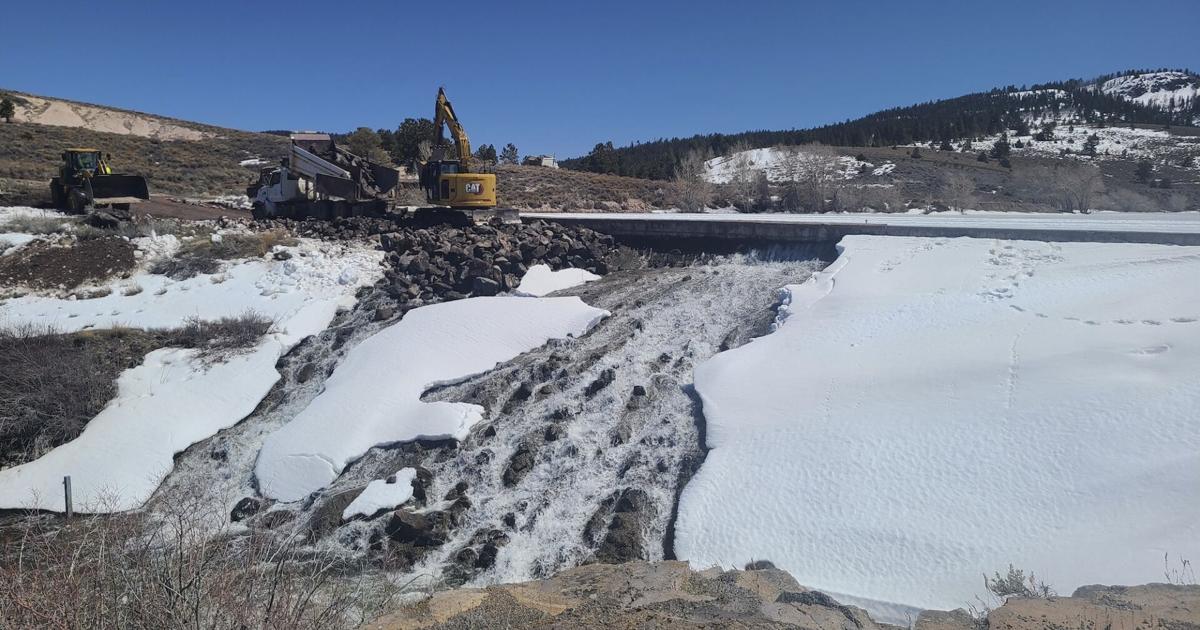UTAH
Evacuation notice lifted downstream from cracked dam
SALT LAKE CITY — An evacuation notice was lifted on April 12 for the southern Utah town just downstream from a fissured dam after public safety officials said they were able to release enough water to prevent a total breach.
Nearly 1,800 residents of Panguitch, a gateway town to the crimson-colored hoodoos of Bryce Canyon National Park, had been on high alert in the days since inspectors discovered an unexpected 60-foot crack in the Panguitch Lake Dam on April 8. Residents rushed to gather their valuables in case of an evacuation as safety crews emptied water into a creek and trucked in boulders to stabilize the wall.
As of April 12, water levels in the reservoir had dropped 8 inches, alleviating enough pressure on the dam that state and local officials said they could confidently lift an evacuation notice urging residents to be ready to leave town within two hours of a breach. Panguitch sits about 10 miles downstream from the dam.
Safety crews planned to continue reducing the water level until it was 1 foot below the cracked section so inspectors could fully assess the damage.
Everett Taylor, an assistant engineer for dam safety with the Utah Division of Water Rights, urged residents to remain vigilant through the spring runoff season.
Over the week, crews cut into an ice sheet that had pushed up against the dam, causing the top to crack and tilt downstream. The ice sheet since pulled back, and the wall was no longer tilting, Taylor said.
The dam was built in the late 1800s, but the top portion that cracked had been added in the 1930s and 1940s. State officials said there were no previous concerns regarding its structural integrity.
IDAHO
SCOTUS OKs ban on gender-affirming care for transgender youth
WASHINGTON — The Supreme Court is allowing Idaho to enforce its ban on gender-affirming care for transgender youth while lawsuits over the law proceed, reversing lower courts.
The justices’ April 15 order allows the state to put in a place a 2023 law that subjects physicians to up to 10 years in prison if they provide hormones, puberty blockers or other gender-affirming care to people under age 18. Under the court’s order, the two transgender teens who sued to challenge the law still will be able to obtain care.
The court’s three liberal justices would have kept the law on hold. Justice Ketanji Brown Jackson wrote that it would have been better to let the case proceed “unfettered by our intervention.”
Justice Neil Gorsuch of the conservative majority wrote that it is “a welcome development” that the court is reining in an overly broad lower court order.
A federal judge in Idaho had blocked the law in its entirety after determining that it was necessary to do so to protect the teens, who are identified under pseudonyms in court papers.

Lawyers for the teens wrote in court papers that the teens’ “gender dysphoria has been dramatically alleviated as a result of puberty blockers and estrogen therapy.”
The American Civil Liberties Union, representing the teens and their families, called the Supreme Court’s order “an awful result for transgender youth and their families across the state.”
Idaho Attorney General Raúl Labrador said in a statement that the law “ensures children are not subjected to these life-altering drugs and procedures. Those suffering from gender dysphoria deserve love, support, and medical care rooted in biological reality. Denying the basic truth that boys and girls are biologically different hurts our kids.”
Gender-affirming care for youth is supported by every major medical organization, including the American Medical Association, the American Academy of Pediatrics and the American Psychiatric Association.
OKLAHOMA
Natural gas companies sued over 2021 storm spikes
OKLAHOMA CITY — Two Texas-based natural gas companies are being sued by Oklahoma, which alleges they fraudulently reduced gas supplies to send prices soaring during Winter Storm Uri, making huge profits while thousands shivered across the state.
The lawsuits are Oklahoma’s first against natural gas operators over earnings during the 2021 storm. The suits were filed against Dallas-based ET Gathering & Processing, which acquired Enable Midstream Partners in 2021, and Houston-based Symmetry Energy Solutions.
Both lawsuits seek actual and punitive damages, as well as a share of any profits that resulted from wrongdoing. Oklahoma’s Republican attorney general, Gentner Drummond, said his office intends to pursue additional litigation against other companies that may have engaged in market manipulation.

“While many companies conducted themselves above board during that trying time, our analysis indicates that some bad actors reaped billions of dollars in ill-gotten gains,” Drummond said in a statement.
A Symmetry spokesperson said in a statement that the company “adamantly denies the unfounded allegations in the lawsuit, which it will vigorously defend.” A message seeking comment left with ET was not immediately returned.
The devastating storm sent temperatures plummeting across the country and left millions of people without power.
ARIZONA
Polygamous sect leader’s guilty plea at risk
PHOENIX — A guilty plea by the leader of an offshoot polygamous sect near the Arizona-Utah border is at risk of being thrown out due to an unmet condition of his deal that hinged on whether others charged in the case also would plead guilty.
Under the terms of Samuel Bateman’s deal, prosecutors can — but aren’t required to — withdraw his guilty plea, after two other men charged in the case rejected plea offers and are now headed to trial.
Bateman, a self-proclaimed prophet who took more than 20 wives, including 10 girls under age 18, pleaded guilty this month to charges of kidnapping and conspiring to transport underage girls across state lines in what authorities say was a yearslong scheme to orchestrate sexual acts involving children.
The U.S. Attorney’s Office in Phoenix declined to say whether it will withdraw Bateman’s plea.
Hearings were scheduled on April 15 and 16 before U.S. District Judge Susan Brnovich over the offers that were rejected by Bateman’s co-defendants.

Bateman’s plea agreement recommends a prison sentence of 20 to 50 years, though one of his convictions carries a possible maximum sentence of life.
In his plea, Bateman, 48, acknowledged taking underage brides, having sex activity with them and arranging group sex, sometimes involving child brides.
Authorities say Bateman created a sprawling network spanning at least four states as he tried to start an offshoot of the Fundamentalist Church of Jesus Christ of Latter-Day Saints.
Congressman to work while undergoing cancer treatment
TUCSON — U.S. Rep. Raúl Grijalva announced on April 2 that he has been diagnosed with cancer, but he said he is continuing to work while undergoing treatment.
“A few weeks ago, I sought medical treatment for a persistent cough which was initially diagnosed as pneumonia. After further testing and imaging, my physician discovered that I have cancer,” the 76-year-old Democrat, the dean of Arizona’s congressional delegation, said in a statement.
It was unclear what type of cancer Grijalva has. The congressman’s office said no other information was being released at this time.

“I am working hard to get healthy and return to business as usual as soon as I am able,” said Grijalva, who was first elected to the U.S. House in 2002 and is seeking a 12th term in this year’s election.
Ruben Reyes, who works for Grijalva as his Southern Arizona district director, said he didn’t think the cancer treatment will affect the congressman’s ability to do his job.
The district Grijalva represents spans most of the Arizona-Mexico border and includes sections of Cochise, Maricopa, Pinal, Santa Cruz and Yuma counties.
“My congressional office remains open and the many services we provide for our constituents continue uninterrupted. I am in regular communication with my staff,” Grijalva said in his statement.






























